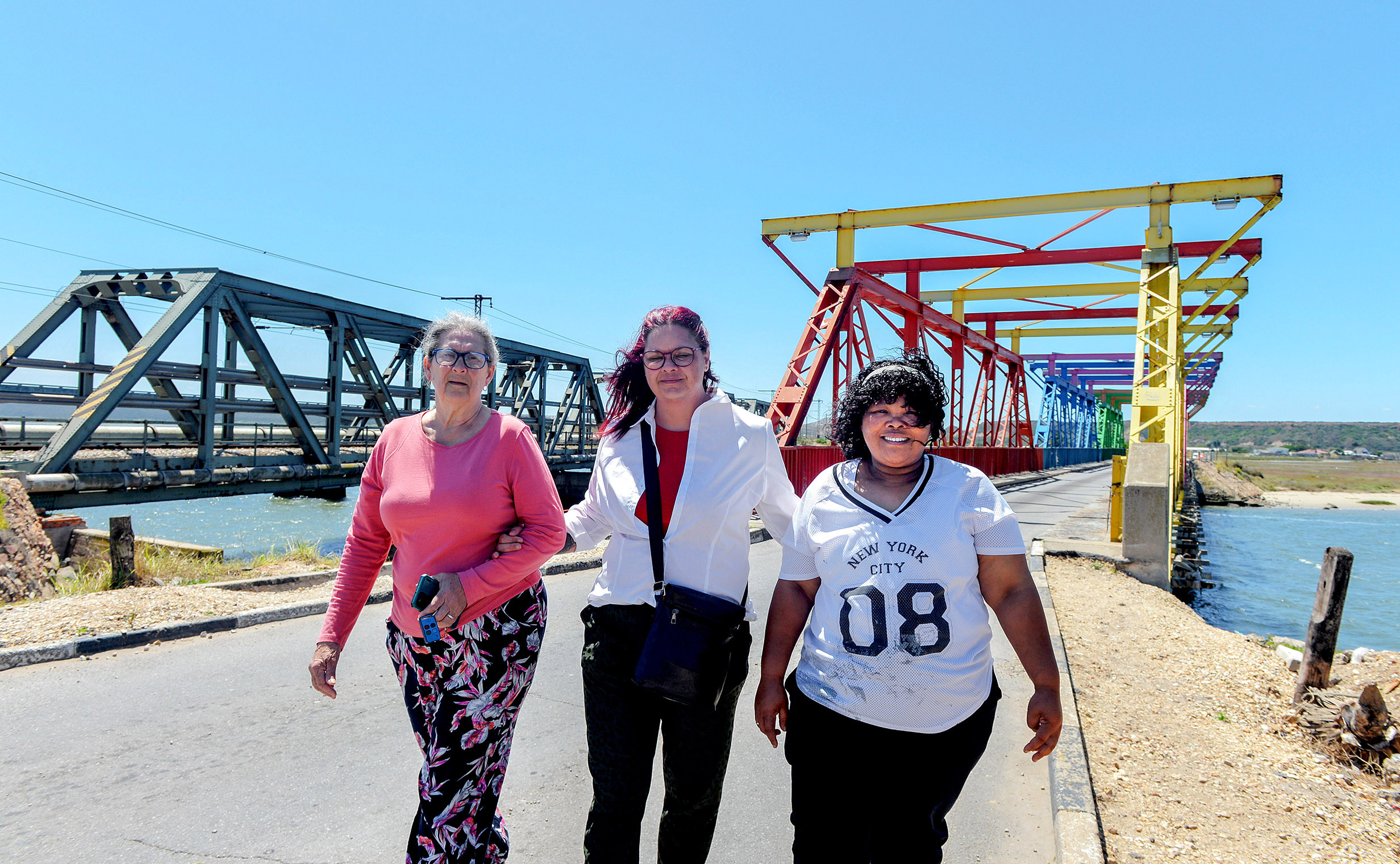‘I won’t lie,” Francis Jeffrey will tell you. “I am 70 and I am frustrated. It gets rough out here some days. So the other day I thought, I have seven dogs. If I pick up all their poo we can make a lekker dog poo Slush Puppy.
“I had a meeting with my group and I said, ‘You put it in a bag and then you throw it at the drivers’. But they are more decent than I am. So they haven’t said yes yet. I am the type of person who will hit a truck driver in the face with a brick. I am that frustrated that I now want to throw dog shit at people.”
A year ago, on 18 October, Jeffrey, Linda Meades, Francis Nkaki and Eileen Leander launched a second petition to force the municipality to take action to repair and protect the historic Wylde Bridge over the Swartkops River. The bridge, also known as the “Smartie Bridge”, was built in 1879 and is the oldest bridge in the metro.
The formidable Jeffrey, a resident of Swartkops for 25 years, who is known for having zero tolerance for shenanigans of any sorts, first sent a petition a few years before, asking for the bridge to be protected. But that one, she said, was chucked into a drawer somewhere and never saw the light of day again.
For the second one, her group decided to exclude politicians so it can be put into action regardless of who is in charge at the metro. The municipality, governed by a coalition since no party won an outright majority in the last elections, has had 18 city managers and acting city managers in the past 10 years, and four mayors in four years.
The bridge was fixed in 2018, but contractors failed to return height restrictors that prevented trucks heavier than 5 tonnes from crossing it.
Soon, superlink trucks on their way to the fresh produce market, car carriers and manganese trucks carrying up to 40 tonnes of ore were using the convenient shortcut on their way to Nelson Mandela Bay’s industrial areas and truck stops.
Read more: ‘Protection racket’ threatens bid to save Nelson Mandela Bay’s historic ‘Smartie Bridge’
The bridge built for heavy trucks is only a few hundred metres from the Wylde Bridge. “But the road is bad, full of potholes, so they take the shortcut,” Jeffrey said.
/file/dailymaverick/wp-content/uploads/2025/10/DSC_1554-copy.jpg)
/file/dailymaverick/wp-content/uploads/2025/10/DSC_1562-copy.jpg)
/file/dailymaverick/wp-content/uploads/2025/10/DSC_1541-copy.jpg)
State of decline
There are clear signs on both roads approaching the bridge showing that there is a 5-tonne weight restriction, but they are simply ignored by many truck drivers.
It is clear that the bridge needs extensive repairs – parts of it are held together by chevron tape and wire.
The petition for new height restrictors and for a pavement, speed hump and road barriers to stop the trucks, paid off and the municipality agreed to meet the group and introduce them to the engineers and other contractors who would work on the project.
Although the restrictors were supposed to be put up within two weeks, the projects stalled. This left Jeffrey, Meades and other women in the community to police the trucks.
Annette Lovemore, A DA councillor in the metro, says her information from the metro is that the contractors left the site because the security firm that was supposed to guard them had not been paid and could not continue work.
Read more: Residents save oldest bridge in Gqeberha as protest and pleas finally pay off
Work, however, started again on Wednesday morning. The municipality’s Sithembiso Soyaya did not respond to a request for comment.
“Our problem is that most of the damage is done at night,” Meades said. “That is when nobody is out here.”
/file/dailymaverick/wp-content/uploads/2025/10/DSC_1566-copy.jpg)
/file/dailymaverick/wp-content/uploads/2025/10/WhatsApp-Image-2025-10-23-at-11.00.43_5a9f6a81.jpg)
Dangerous area
Jeffrey says she won’t go there at night. “This place is rotten with drugs and robbers. But I hear the trucks at night,” she said. “And it makes me angry. There are days when I see this bridge and I can already imagine the bodies in the water on the day it will collapse. Even today, if you are on the bridge when one of these big trucks is crossing it, you can feel it give way already.”
Meades added that “things get ugly out here. Truck drivers used their vehicles to scare and intimidate the women into leaving. “They just won’t stop and they will aim for you.”
Jeffrey, who sometimes uses a walker because she has a knee problem, said that on the day they were meeting the engineer, a truck, trying to cross the bridge illegally, aimed for her as she tried to turn him around.
“If Eileen didn’t push me aside I would have been dead,” she said. “I went to one side and my walker went to the other side. Ugly words were said after that,” she laughs.
Jeffrey’s reputation as a fearsome protector of the bridge precedes her. During a walk with her on the rickety bridge, motorists driving past hoot and shout greetings. “Skel hulle, Tannie Francis, skel hulle!” one man shouts. [You tell them, Auntie Francis, you tell them].
Recently one of the flag ladies working on the project to repair the bridge tried to stop a truck. “The trucker started swearing at her and threatening her. Luckily there were other guys working on fibre close by who rushed to help,” said Meades.
“A police officer who was having his van’s tyres fixed nearby also came to assist,” she added. At one stage we thought the truck was going to try to hit the police van too,” she added. A criminal charge was laid after this incident.
“The thing that bothers me is that the contractor doesn’t want to put steel height restrictions up,” says Jeffery.
“They want to mess around with PVC. Why? If a truck gets damaged by a steel barrier it will be his problem.” She also points out that PVC barriers have been destroyed by trucks pushing them aside.
The women protecting the bridge have been posting pictures of trucks and their number plates on a WhatsApp group. Meades says the members are in touch with some of the transport operators to report trucks crossing the bridge illegally, and many help them by speaking to the drivers.
But some business owners in the area welcome the truckers. “There is one fuel station nearby that offers truckers a free cooldrink if they fill up their tanks, at a cost of up to R40,000.
“I am 70. I really don’t want to see bodies on the water when this bridge falls,” Jeffrey said. “It will be the end of me.”
Even buses, filled with children, try to cross the bridge but get turned around by the women. And the trucks keep coming. In the morning, 20 trucks on average try to cross the Wylde Bridge from both sides.
“Shame, one guy approached this bridge at a very fast speed. We tried to turn him around but he said someone was shooting at him on the other road and his boss said he must get to the SAPS (on the other side of the bridge). We let him go. We watched how he drove. He was in a very big hurry,” Meades said.
She said that a few weeks ago she received a call while her son, Nathan, was helping out at the bridge. “I got the call and I just heard, ‘Aunty Linda, you must come, they are busy moering Nathan’.
“I could hear the caller running. A truck driver was trying to hit my son and drive over Frances Nkaki’s car. I swore a lot that day. We had to call the police that day too.”
She said while they have their hands full some days, many of the truck drivers turn around when they are asked. “Some come to ask if they can’t cross. But we sort them out right there if they are too heavy.” DM





 From left: Francis Jeffrey, Linda Meades and Eileen Leander at the Wylde Bridge in Gqeberha, 20 October 2025. (Photo: Deon Ferreira)
From left: Francis Jeffrey, Linda Meades and Eileen Leander at the Wylde Bridge in Gqeberha, 20 October 2025. (Photo: Deon Ferreira)